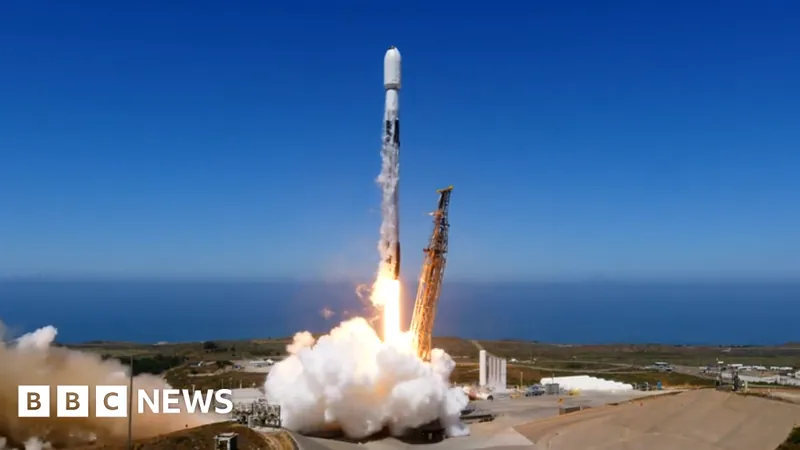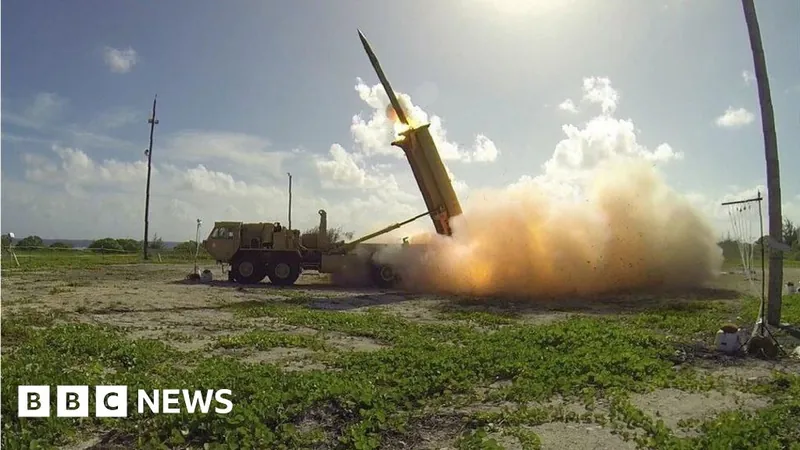
African Nations Ignite a New Era in Space Exploration with Satellite Launches
2024-10-15
Author: Charlotte
Introduction
In a remarkable display of innovation and ambition, African nations are racing to establish their presence in space, marking a significant leap in technological advancement for the continent. On August 16, 2023, a launch vehicle carrying 116 satellites departed from Earth, a testament to the growing interest and investment in space technology across Africa. Among this impressive array was GaindeSAT-1A, Senegal's inaugural satellite, symbolizing a bold stride towards achieving technological independence.
Technological Sovereignty
GaindeSAT-1A, a compact CubeSat designed for earth observation and telecommunications, has been hailed by Senegal’s President as a major milestone towards what he calls “technological sovereignty.” This milestone reflects a larger trend where African countries are beginning to take control of their technological destinies, harnessing satellite data for crucial applications such as monitoring agriculture, predicting extreme weather events, and improving communication in remote areas.
A Paradigm Shift in Space Exploration
Kwaku Sumah, founder of Spacehubs Africa, highlights a critical shift in the landscape of space exploration. "The cost of launching satellites has plummeted in recent years," he notes, allowing smaller nations to join the global space race. In fact, 17 African countries have successfully launched over 60 satellites into orbit. Alongside Senegal, Djibouti and Zimbabwe have also successfully operated their first satellites in the last year, with many more planned for the near future.
Challenges and Gaps in Autonomy
Despite this progress, Africa still lacks its own space launch facilities, highlighting a gap in autonomy as powerful nations often leverage their involvement in African space programs to strengthen diplomatic ties. This presents a double-edged sword, as while it adds resources, it raises concerns over external influence in the region’s space initiatives.
The Importance of Indigenous Capabilities
Experts assert that having indigenous satellite capabilities is crucial for African nations. Sumah argues that local control over technology will foster better access to satellite data specific to the continent's needs. Notably, Sarah Kimani from the Kenyan Meteorological Department emphasizes the importance of satellite monitoring to track climate-related threats. With recent advancements, including Kenya's own earth observation satellite launched last year, the nation is better equipped to respond to severe weather conditions, enhancing early warning systems.
Perceptions of Space Exploration
However, the path to space is not without challenges. Jessie Ndaba, co-founder of Astrofica Technologies, notes that many in Africa still perceive space exploration as an elitist pursuit. She stresses the importance of focusing on practical issues like climate change, advocating for satellite technology to be applied in tackling pressing challenges such as food security and natural disasters.
Optimism for the Future
Though there is much dependency on foreign technology and expertise, figures like Temidayo Oniosun from Space in Africa are optimistic. Senegal's GaindeSAT-1A, though developed with international partnerships, showcases the capacity of local talent, which is vital for building a sustainable space industry.
Geopolitical Dynamics
The geopolitical dynamics in Africa's growing space sector cannot be overlooked. With countries like China and the United States vying for influence, experts warn that African space initiatives may also serve as arenas for global power rivalry. Nonetheless, Sumah believes that by navigating these relationships wisely, African nations can leverage global interest for mutual benefit.
The Future of African Space Exploration
Looking forward, the prospects for African space exploration appear bright, with approximately 80 satellites currently in development across the continent. The potential for establishing space ports, particularly in equatorial regions, could allow African nations to emerge as significant players in the global space sector.
Conclusion
As Africa continues to chart its course into the cosmos, there is a palpable sense of excitement. The continent is at the brink of a revolution in space technology, and many are eager to see how this journey unfolds: can Africa become a beacon of progress in the final frontier?









 Brasil (PT)
Brasil (PT)
 Canada (EN)
Canada (EN)
 Chile (ES)
Chile (ES)
 España (ES)
España (ES)
 France (FR)
France (FR)
 Hong Kong (EN)
Hong Kong (EN)
 Italia (IT)
Italia (IT)
 日本 (JA)
日本 (JA)
 Magyarország (HU)
Magyarország (HU)
 Norge (NO)
Norge (NO)
 Polska (PL)
Polska (PL)
 Schweiz (DE)
Schweiz (DE)
 Singapore (EN)
Singapore (EN)
 Sverige (SV)
Sverige (SV)
 Suomi (FI)
Suomi (FI)
 Türkiye (TR)
Türkiye (TR)